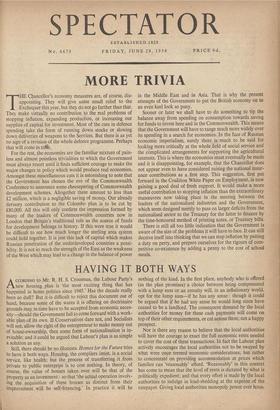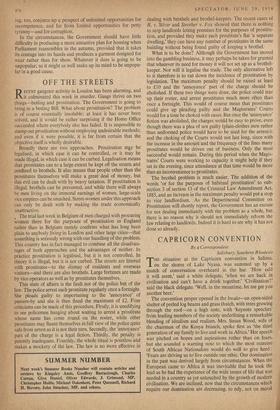HAVING IT BOTH WAYS
ACCORDING to Mr. R. H. S. Crossman, the Labour Party's new housing plan is 'the most exciting thing that has happened in home politics since 1945.' Has the decade really been so dull? But it is difficult to reject this document out of hand, because some of the wares it is offering on doctrinaire grounds may in time have to be accepted from economic neces- sity—should the Government fail to come forward with a work- able plan, of its own. If Conservatives dare not, and Socialists will not, allow the right of the entrepreneur to make money out of house-ownership, then some form of nationalisation is in- evitable; and it could be argued that Labour's plan is as simple a solution as any.
Still, there should be no illusions. Homes for the Future tries to have it both ways. Housing, the compilers insist, is .a social service, like health; but the process of transferring it from private to public enterprise is to cost nothing. In theory, of course, the value of houses taken over will be that of the property as an investment : so that 'the actual operation involv- ing the acquisition of these houses as distinct from their improvement , will be self-financing.' In practice it will be nothing of the kind. In the first place, anybody who is offered (as the plan promises) a choice between being compensated with a lump sum or an annuity will, in an inflationary world, opt for the lump sum—if he has any sense : though it could be argued that if he had any sense he would long since have ceased to be a landlord. The consequent demand by the local authorities for money for these cash payments will come on top of their other requirements, or cut across them; not a happy prospect.
Nor is there any reason to believe that the local authorities will have the courage to exact the full economic rents needed to cover the cost of these transactions. In fact the Labour plan actively encourages the local authorities not to be swayed by what were once termed economic considerations; but rather to concentrate on providing accommodation at prices which families can 'reasonably' afford. 'Reasonably' in this context has come to mean that the level of rents is dictated by what is politically expedient; and that every effort is made by the local authorities to indulge in load-shedding at the expense of the ratepayer. Giving local authorities monopoly power over hous- ing, too, conjures up a prospect of unlimited opportunities for incompetence, and far from limited opportunities for petty tyranny—and for corruption.
In the circumstances, the Government should have little difficulty in producing a more attractive plan for housing when Parliament reassembles in the autumn, provided that it takes its courage into its hands and produces a garment designed for wear rather than for show. Whatever it does is going to be unpopular; so it might as well make up its mind to be unpopu- lar in a good cause.



































 Previous page
Previous page